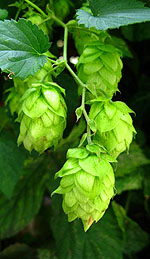 Hops is a household word in beer-drinking communities around the world. Beer commercials tout the benefits of aged hops, and the flavor that results from harvesting only the best female plants for brewing. Most of those commercials don’t dive into the male-female aspect of hops plants, but the truth is hops used in beer brewing and as oil is only harvested from female plants.
Hops is a household word in beer-drinking communities around the world. Beer commercials tout the benefits of aged hops, and the flavor that results from harvesting only the best female plants for brewing. Most of those commercials don’t dive into the male-female aspect of hops plants, but the truth is hops used in beer brewing and as oil is only harvested from female plants.
Hop oil has risen to the top of the list of aromatherapy oils that have the ability to deal with tuberculosis, cancer, cystitis, intestinal issues and menstrual cramping. Hop oil is harvested from the dried flower cones of the plant.
The cones have resin glands coated with a permeable membrane. Inside the glands are molecules, which include hop resin, composed of 250 chemical compounds, many of which are antioxidants. Maintaining the integrity of the hops lupulin glands is essential in order to produce quality oil that contains all the compounds necessary for beneficial medicinal results.
Nervous conditions, sleeping disorders, and digestive issues are treated using hop oil either in baths or by inhalation, but the oil can be administered using other aromatherapy methods as well. Hop oil mimics valerian root oil, and so it is used to treat anxiety, insomnia, and restlessness. Hop oil is especially effective in treating these conditions when it is combined with valerian oil.
The chemical component dimethylvinyl carbinol, found in hop oil, plays an important role in relaxing the nervous system. Women find great value in hop oil when menstrual cramping becomes a monumental mountain of discomfort that hinders daily life, and men also find relief from stomach cramps and insomnia through using hop oil.
Specific polyphenols, such as daidzein and genistein were recently detected in hop oil, but in extremely low concentrations. These polyphenols are also present in soya oil. They are phytoestrogens, which imitate the activity of the natural female hormone, oestradiol. Hop oil is one oil that may support estrogen levels during menopause and reduce uncomfortable hot flashes and other symptoms. Phytoestrogens may also offer protection against specific hormone-sensitive cancers. That’s another reason why hop oil is being recognized as a very important essential oil.
Ghent Laboratories is conducting more studies on hops and hop oil. These ongoing studies confirm slight estrogen activity, but different hop varieties display different estrogen effects. This important research is revealing more pertinent facts about hop oil and its effectiveness in regards to cancer growth. The studies do indicate that hop oil is one of the richest natural sources of estrogen. That is exciting news for men and women who are searching for natural cancer protection within the realm of essential oils.
